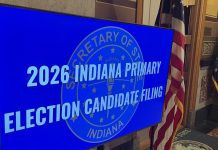By John Krull
TheStatehouseFile.comÂ
EDINBURGH, Scotland – If we listen, blood can whisper old, even ancient, truths to us.
Long, long ago, my ancestors lived in this country. My mother’s people were lowland Scots. They lived here, the family stories go, until they bet on the wrong side in one of Britain’s many battles of royal succession. They found themselves transported to Northern Ireland, where they were supposed to serve as a Protestant presence grafted onto a determinedly Catholic land.
Several generations later, not many years before the American Revolution, they left and landed in the Carolinas, before heading north to Indiana around the time of the War of 1812.
But they began in this land.
Part of me – part of my children – began in this land.
I didn’t journey first to Scotland until I was in my late 30s. My wife and I came on our honeymoon. We roamed from Edinburgh to Inverness to the Isle of Skye. We walked over streets that were here when my ancestors lived in this land. We hiked trails both green and stony.
Scotland spoke to me then.
It’s spoken to me ever since.
It wasn’t just that the country is beautiful – although it is beautiful. The sky here achieves shadings of blue and gray that can soothe the most unquiet spirit. The highlands have a harsh, craggy splendor, earth and stone reminders of the weight of eternity.
But it also was that this place was part of me.
One of the homes of my heart.
On that first trip, while my new bride did some shopping in Edinburgh, I stopped at a pub for a pint. Or two.
The guys at the table next to me started reciting poetry. They were several rounds ahead of me. The drinks took the edge off their Scots burrs and transformed every “s†into â€sssssh.â€
It also made their recital endearing, particularly when they reached the climax.
A man’s a man for ‘a that.
Even slurred, Robert Burns’ poetry spoke Scotland’s soul.
I also wandered the bookstores in Edinburgh, Inverness and elsewhere, reading upon the Scottish Enlightenment as my wife and I traveled – the long struggle to unshackle the human mind and spirit from all forces that would bind them. As I did, I understood in ways I never had before the devotion my mother’s people had to learning and to charting their own courses. I began to realize my resistance to outsourcing my thinking might be more than a personal quirk.
The inertia of generation after generation after generation fighting to find its own way could have done something to push me down that path.
One late afternoon, we stopped the car along an ocean cliff. I walked out to the edge of the bluff and looked at the water, whitecaps rippling the surface as far as my eye could see.
I never have been a man who finds peace with ease. At that moment, though, I felt nothing but serenity.
As I stared from atop that craggy bluff at the long stretch, I thought about the people whose blood flowed through my veins and how they walked this land centuries before I was even a notion. I thought about the children my wife and I wanted to have.
In that moment, I saw and felt both how important I was in the living moment to my wife and, God willing, my children and how small a piece I was in the endless chain of existence.
I thought about how big and how small we all are.
We’ve been given reason these days, in some of the worst possible ways, to reflect upon where we all came from. Regardless of the motivation, it’s worthwhile exercise, because such reflection, if done with honesty and in the right spirit, should engender humility.
And gratitude.
I’m in Scotland again, this time with my son, who is approaching his own age of manhood.
As he and I stroll these ancient streets, I think about where life might take my children and where it took all those came before us.
As my son and I walk, the past itself seems to flow through our veins.
If we listen, our blood can whisper truths to us.
John Krull is director of Franklin College’s Pulliam School of Journalism and publisher of TheStatehouseFile.com, a news website powered by Franklin College journalism students.





